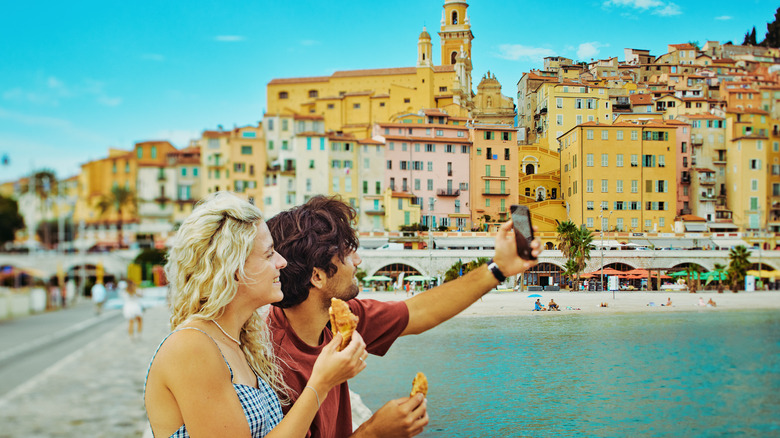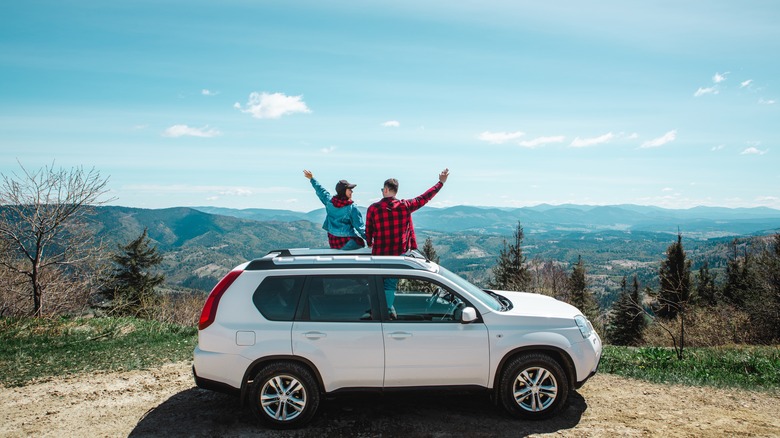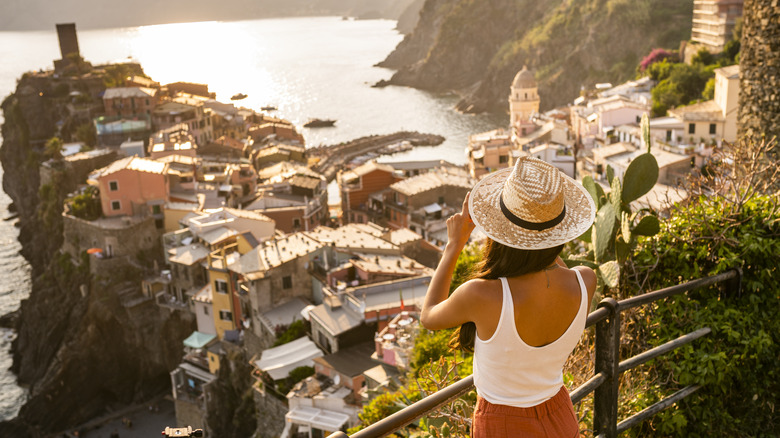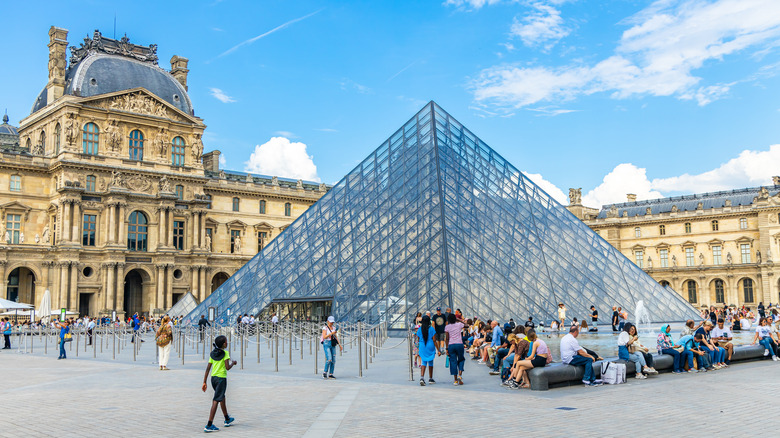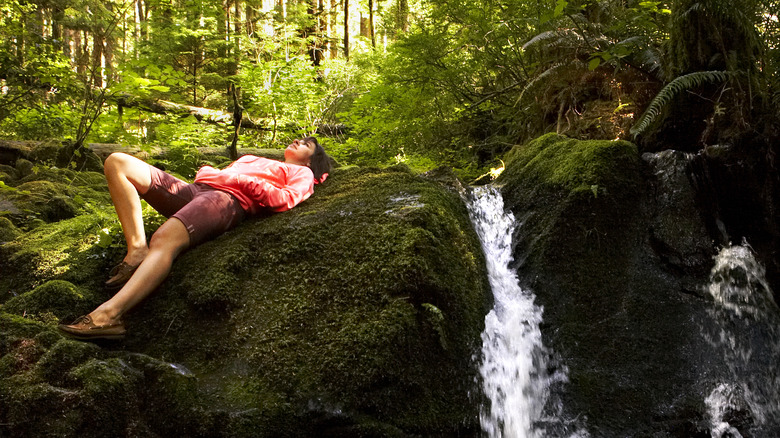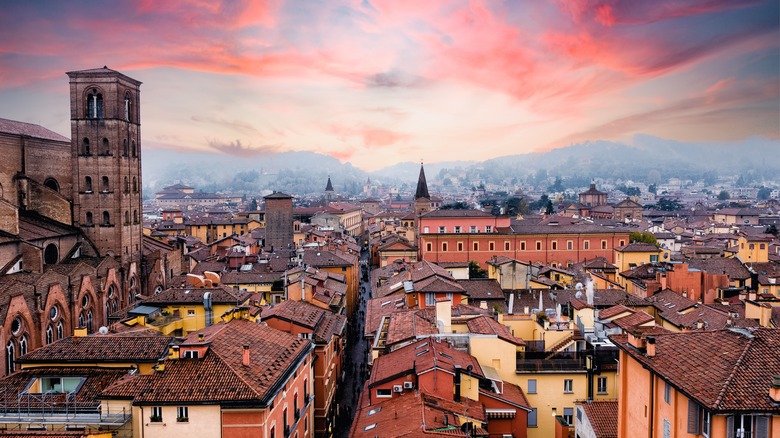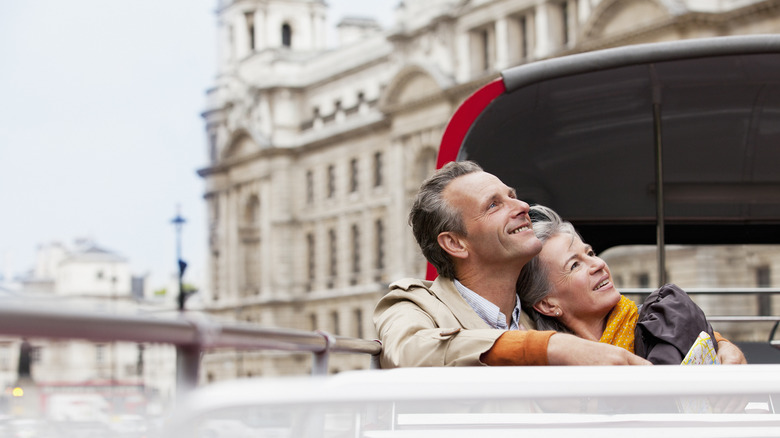Ways To Avoid Being An Annoying Tourist When Visiting Europe
The European continent offers a richness of culture, unique experiences, and nature and city environments in amazing abundance. Exploring the scores of European countries can be an eye-opening opportunity. From east to west and its northern reaches to southern beaches, Europe provides perhaps even more physical diversity than North America while packing in countless distinct cultural and historically meteoric identities among its population.
Nearly 12 million Americans traveled to Europe in 2023, with all manner of continental (and island) destinations factoring into these tourists' plans. Some people go to touch base with cultural roots — the United States is, after all, a place of great ancestral variance — while others seek brand new experiences that take them completely out of their comfort zone. Finding great little gems in the form of lesser-visited European countries and cities or budget-friendly destinations can be a fantastic way to make the most of your time away. However, many people worry about the common trope of the annoying tourist. Everyone's seen one of these individuals traversing the streets. Brash, camera-wielding, and loudly dressed, the annoying tourist is a stereotype many American travelers want to avoid when exploring a new place: Here's how to do it.
Understand the norms around talking politics
Political conversation is unique in every city and town you'll visit anywhere in the world. From gigantic, sprawling metropolises like Paris or London to adorable small towns such as Rovinj and Freiburg, every local space will have its own flavor of routine political conversation. That is to say, in some places, people won't want to talk politics at all, while in other cities and countries, it's nearly a free-for-all when it comes to talking elections, policy, and political personalities.
One of the biggest lessons that any American tourist can learn when traveling in Europe (or anywhere abroad, for that matter) is the value of keeping it to yourself. American politics is a thing of great division these days. As a result, Europeans from Maynooth to Minsk may often ask you about your take on election news and other features of modern American politics. From personal experience, this is less of a conversation starter and more of a small-talk staple. Almost no one actually wants to hear your comprehensive take on the latest congressional hearings or what that one governor is up to. If someone makes a comment about current affairs or political life in the U.S., they often aren't inviting you to lay out your take; they're simply making conversation and focusing on something you're likely to find familiar. No matter what your political opinions might be, it's typically best to keep the bulk of them to yourself.
Getting loud when drinking is a no-no
If you're a loud drinker, you're almost certain to draw attention to yourself when traveling — even in booze-friendly locations where drinking might be on tap. People on vacation often seek to live at least partially in the moment and enjoy a carefree adventure in another part of the world. Hitting up the local nightlife or relaxing with a cold one against the backdrop of a beautiful vista is standard practice.
There's absolutely nothing wrong with having a few drinks while you're on vacation. But for those looking to fit in while exploring Europe, understanding your limits is a good idea when drinking. Loud tourists stick out like a sore thumb on a continent often marked by various drinking cultures (think the whiskey and Guinness scenes in Ireland, winemaking and drinking culture in France, Italy, and Spain, and the weight-in-beer winnings of Finland's wife-carrying competition). As a result, you may end up on the receiving end of more than a few odd looks if you're noticeably loud and obnoxious when drinking. Keeping your good times in control and maintaining a bit of general discretion is a great way to fit in like a local, no matter where you're exploring in Europe.
Don't smile so much
This might sound like strange advice, but smiling is a surefire way to find yourself sticking out in a European crowd. This might not always mark you as an annoying tourist, but it puts you at least in the vicinity. Of course, it's hard not to be excited when visiting a brand-new place. Smiling is often something that can't be helped when taking in views of a glorious cityscape or natural environment. However, it might be worth considering how people who are local to the area might act, as well as a brief aside about how you act when you're in your own home. This wonderful new experience you're taking in is found in a place that other people are lucky enough to call home. To them, all the magical new experiences you're so excitedly gawking at are normal sights, sounds, and occurrences.
If you keep your smiling to a moderate level, you'll avoid drawing unwanted attention to yourself and can skip out on the added experience of having people stare at you throughout your holiday. Take a brief moment to consider this feeling of home and smile on the inside instead. It will also help make you feel more at home in the unique place you're visiting, adding a new dimension to the amazing trip.
Consider traveling in off-peak seasons
Traveling during off-peak seasons (either the shoulder season or at the lowest points in a destination's tourist flow) is a great way to get more bang for your buck. Off-peak deals can be immensely valuable for travelers looking to enjoy a wonderful holiday on a moderate or even threadbare backpacker's budget. But travel at these strategic times of the year isn't just a solid choice for budget-friendly holiday planning. Indeed, off-peak tourism feeds the economy of a local community after the rush of peak vacation season has died off. It's a great way to give back to a community that supports the adventurous exploits you hold in your heart.
Not only does off-peak travel bring about numerous financial benefits, but it's also a solid strategy to employ when looking to fit in a little more like a local. Europeans have tons of low-cost airlines available for continental travel on a supremely tight budget. As such, many adventurers will seek out the lowest-cost airfare and hotel deals they can find, opting instead to focus most of their budget on the actual experience of the place they're visiting. Often, this means traveling outside the highest volume tourist seasons. Follow the example of European tourists and do as they do.
Don't just stare at things through the camera lens
Another routine habit that tourists often fall into is the overreliance on cameras and smartphones. Taking tons of pictures is often to be expected; there's just no denying the fairytale nature of some European villages, cities, and towns. But interacting with a new and exciting place isn't just about taking pictures of it. Europeans will often notice people who spend their entire day taking pictures of things, and not in a good way. In order to shed the moniker of the annoying tourist, consider putting down your phone or digital camera and try just looking at the scenery for yourself.
There are some things that pictures just can't reproduce. The monumental history of the Roman Colosseum or the dense enormity of Belfast's Peace Wall simply can't be captured through the lens, no matter how hard photographers might try. It's always a good idea to snap a few pictures of the things you're experiencing, but in order to step away from the common tourist tropes, a true adventurer will want to set down the camera and experience the environment and all that it has to offer firsthand rather than in snapshot form. The experience will be far more rewarding, and the locals will respect you more for your attention.
Try to dress like the locals
Americans often wear clothing heavily adorned with logos — specifically those of sports teams, college emblems, or designer emblems. Europeans aren't brand-shy themselves, but many people visiting the continent will find that European style is far less bright and in your face. People across Europe will wear stylish clothing, but branding isn't quite as ubiquitous. Collegiate clothing, in particular, isn't something you'll find with much frequency. The same goes for sports gear — although soccer is very popular, and fans may throng the streets in team colors if their local club is playing at home on the day you visit.
One exception is the baseball cap. People across Europe will often wear Yankees or Dodgers caps as a fashion statement. These team logos are readily available and often well-known, considering their correspondence with the fashionable climes of New York and Los Angeles. Generally, however, European style is sensible, fashionable, yet subdued. It's not often attention-grabbing or logo-driven. Taking a page out of their book when visiting the continent will help you blend in and explore your chosen destination more like a local might. Bright or busy clothing — and the addition of a travel backpack, for instance — may immediately peg you as a tourist and gain you a bit of unwanted attention.
Eat what the locals eat
Eating the same food as the people who live in the place you're visiting is a great way to show respect to the people, their home, and their history. It's also a step that makes life on holiday so much easier. Instead of needing to constantly find a McDonald's or some kind of familiar dining option, local restaurants, and food choices provide a much broader opportunity to immerse yourself in the culture and place.
Not only does this give you the ability to step away from the label of annoying tourist (a trope also characterized by an unwillingness to step out of known comfort zones and eat foreign cuisines), but it's also a phenomenal opportunity to experience yet another component of the place you're visiting. Moreover, with the entire scope of a city's dining options on the table, there's no end to the variety and choice you have before you. Rather than relying on the same restaurant or two throughout the duration of a vacation, adventurous travelers have a kaleidoscopic wealth of options at their fingertips. On top of the wonderful cultural immersion that local cuisine brings, it's often more cost-effective, too. American-style restaurants located in tourist-heavy cities and towns often sport inflated prices to take advantage of the very tourist you're trying to avoid being.
Ignore tourist hotspots and look elsewhere
Some of the best cultural experiences hidden within the bones of a treasured European city can be found just off the beaten path (or perhaps a little farther in some cases). Following guidance from locals will help you discover some of the lesser-known destinations that provide an equally stunning — if not even more impressive — day out and about in a brand-new place. There will always be a few must-see destinations, but these aren't the only attractions that draw tourists into their home cities.
Rick Steves' European adventures often revolve around this kind of planning. Looking for suggestions from those who know the area intimately can make for a uniquely valuable experience chock full of memories and one-of-a-kind sightseeing opportunities. Local culture that exists beyond the whitewashed façade of the heavily traversed tourist hotspots is pure and unfiltered. It's the stuff that most people are actually looking for when they visit Europe; they just might not understand that the most popular spots don't exhibit it.
Respect the environment and all that it supports
It should go without saying that a healthy respect for the environment is crucially important for anyone exploring any part of the world. The local ecosystem — even one that's been transformed into an urban sprawl of concrete and predominantly human life — is a fragile thing, and it can be harmed significantly if people stop caring for it. No matter where you find yourself in Europe, you're likely to see the locals exhibiting generally good stewardship of their home community. This is a common theme throughout the continent, and Europeans often take environmental protection and conservation efforts seriously.
As a result, it's never a good idea to throw trash on the ground, trample around carelessly in a natural environment, or even carelessly toss plastic packaging that could be recycled into a trash can (when recycling options are available). People across Europe take these things seriously, and seeing someone come into their home space with a disrespectful attitude is a great way to mark yourself as a truly annoying and perhaps even ignorant tourist. Make sure you do your part to respect the community space you're treading in. This can be as simple as walking on paths and sidewalks rather than grassy or other growing areas, and holding onto plastic and other recyclable packaging to leave the place you're visiting just a little bit better off than how you found it.
Do your homework and respect the cultural norms
Not only is a respect for the space itself important, but tourists who don't want to come across as rude, annoying, or otherwise will want to showcase a marked respect for the cultural history and norms of the place they're exploring. Every country — and many individual cities within them — takes pride in a unique blend of historical significance and modern customs that shape the way its people behave and interact.
Europe is nothing if not a gigantic tapestry of ever-evolving identities, communities, and histories that extend back thousands of years. The people who live across the continent today hail from all walks of life and look back on a truly glorious history that has risen to modern life amid some of the most compelling stories of humanity's past. Doing your homework and understanding at least a smidgeon of the place you're visiting's customs, history, and people will gain you a serious level of respect from the local community. All too often, tourists sweep through a community and take in a surface-level helping of the place. This isn't a great way to get immersed in a culture, and it can leave the locals with a sour taste in their mouths. Consider a few guidebooks that focus some attention on custom and culture for a well-rounded outing in any corner of Europe.
Take steps to help prevent 'anti-tourism'
'Anti-tourism' is a backlash against the tourist-obsessed practices of a government, a community's attractions, or the tourism industry more broadly. People who live in a community expect to be treated with dignity and enjoy the culture of their own space without tourists inhibiting their daily life, and anti-tourism sentiment is currently making its way through some of the Spanish island destinations. The concerns of locals are aimed at overcrowding, environmental issues, and a lack of respect for the community by those coming to visit, among other issues.
A toxic environment isn't good for anyone. It makes the locals resent visitors and puts holidaymakers on edge, souring their experience and limiting interest in a return to what might otherwise represent a special vacation destination. Rick Steves is again instrumental in his advice for travelers hoping to maintain a healthy relationship with a place and its people. He suggests buying tickets in advance for the most popular destinations on your travel list. Steves also notes that learning a few key phrases can help bridge the gap between yourself and the community. Showing an interest in learning about the people and place you're in can go a long way to building a true human connection that helps prevent this negative sentiment.
